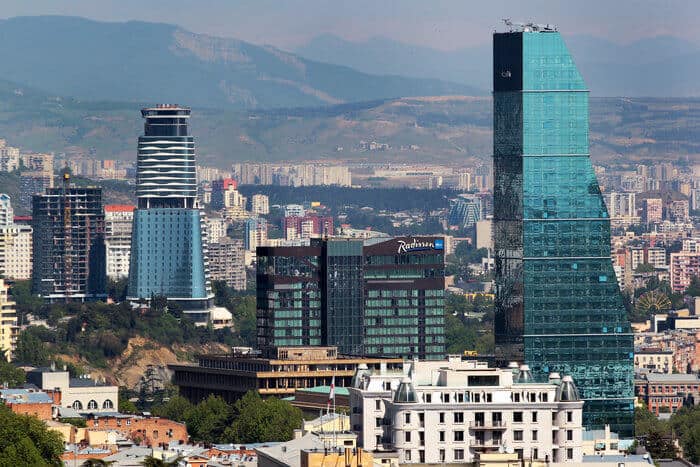Georgia, situated between Europe and Asia, has become an increasingly attractive destination for property investors, digital nomads, and expats. With its welcoming attitude toward foreigners, low taxes, rapidly developing infrastructure, and high rental yields, the country presents a compelling case for real estate investment.
From the vibrant capital of Tbilisi to the coastal charm of Batumi and the affordability of Kutaisi, Georgia offers a diverse range of options for buyers looking to benefit from long-term capital appreciation or rental income. This guide covers everything prospective buyers need to know before entering the Georgian property market in 2025.

Why Invest in Georgian Real Estate?
Georgia’s popularity has increased in recent years, thanks to a combination of economic growth and a favourable business environment. The tax system is attractive, with a personal income tax rate of 20% and special incentives available for landlords and entrepreneurs. Property rental income, when properly registered, is taxed at just 5% for residential lettings.
The absence of a stamp duty on property purchases and a capital gains tax exemption after two years of ownership further enhances the appeal. Moreover, the registration process is fast and inexpensive, usually completed within one to four working days through the country’s efficient Public Service Halls.
Foreigners are granted equal rights to purchase and own real estate in Georgia—on a freehold basis—without any special permits. The only limitation applies to agricultural land, which remains restricted due to the Georgian legislation.
Where to Buy: Best Cities and Districts
Tbilisi remains the most robust and diverse market in Georgia. Investors seeking long-term rental demand should consider established districts such as Saburtalo, Vake, and Avlabari. For short-term rentals, areas near the historic old town, such as Sololaki, Mtatsminda, and Vera, remain highly popular among tourists.
Batumi, located on the Black Sea coast, has evolved from a seasonal tourist hub into a year-round rental market. The city is seeing rapid growth in high-rise, mixed-use developments with modern amenities. Many developers in Batumi offer guaranteed rental returns and property management services, making it an ideal location for passive income seekers.
Kutaisi, Georgia’s third-largest city, is emerging as a value-focused destination. Property prices there are significantly lower than in Tbilisi or Batumi, offering investors with a limited budget the chance to enter the market affordably.
Legal Framework and Due Diligence
Purchasing property in Georgia is straightforward, but buyers are strongly advised to carry out legal due diligence. Each property has a unique cadastral code, and all ownership and encumbrance information is recorded in the national property registry.
A lawyer can verify the legal status of a property, check for mortgages or liens, and ensure the seller has the right to transfer ownership. Property registration is done at the Public Service Hall, and once your name is registered under the cadastral code, the property is legally yours.
Georgia also allows real estate purchases to be completed remotely through a Power of Attorney, making it convenient for foreign investors who cannot be physically present.
Residency Through Property Investment
Owning real estate in Georgia can be your gateway to legal residency. If the market value of your real estate portfolio exceeds USD 100,000, as certified by an accredited appraiser, you may apply for a temporary residence permit. This permit is renewable annually and extends to your spouse and dependents.
For more substantial investors, a USD 300,000 investment qualifies for a five-year investment residence permit. This route can lead to permanent residency after five years, provided the investment is maintained and other conditions are met.
Banking and Financing
Opening a bank account in Georgia is easy for foreigners. A valid passport is typically all that is required. Major banks like Bank of Georgia and TBC offer multi-currency accounts, mobile banking, and premium services for clients with larger deposits. However, banks apply strict anti-money laundering (AML) checks and may request documentation for large transfers, especially international ones.
Mortgage financing is available to foreigners, but conditions are typically stricter than for locals. Expect to make a down payment of at least 30%, with loan terms not exceeding 10 years. Interest rates for USD loans start around 6%, while GEL-denominated loans may exceed 11%.

Conclusion
Georgia offers a rare combination of affordability, simplicity, and opportunity in the global real estate market. From low taxes and straightforward purchase procedures to high rental returns and growing demand, the country is well-positioned for investors looking to diversify internationally.
However, success in Georgia’s real estate market requires more than just spotting a good deal. It takes local knowledge, legal diligence, and the right support to avoid costly mistakes.
If you’re considering buying property in Georgia—whether for personal use, investment, or residency purposes—we invite you to contact our team for a consultation. We offer full-service legal and real estate assistance tailored to foreign buyers, including due diligence, contract drafting, and complete representation throughout the process. Reach out today to ensure your investment is secure, compliant, and profitable.


